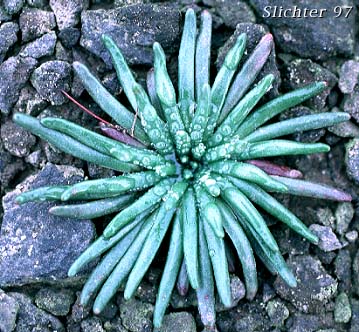 Leaves of the bitterroot at
right. Photo from Catherine Creek, Columbia Gorge Scenic Area March 1993.
Leaves of the bitterroot at
right. Photo from Catherine Creek, Columbia Gorge Scenic Area March 1993.
Bitterroot is a very attractive wildflower suited for dry, naturalized gardens. It is a low plant with numerous narrow leaves in a basal rosette (See photo at right.), and lacking a large flower stem with leaves. The thick, fleshy leaves appear before the flowers appear and whither as the flowers bloom. The leaves range from 1.5-5 cm long and are linear-clavate. The short, leafless stem ranges from 1-3 cm tall, and has a whorl of 5-6 linear bracts from 5-10 mm long at its tip. The large showy flowers are variable in color, from whitish, rose, to deep pink. The 12-18 (usually 15) petals are oblong-oblanceolate in shape from 18-35 mm long. The 6-9 (usually 4) sepals are oval, 10-25 mm long, and often similar in color to the petals. The stamens are numerous, numbering 30-50. There may be just one flower on the stem, but more typically there are 2-3.
The fleshy taproot, although bitter in taste, was highly prized by native Americans as a food source. Commonly it was dug as the leaves developed, at a period when they were less bitter. They were peeled and boiled, then eaten immediately or dried for later use. The bitterroot is also the state flower of Montana.
Bitterroot is found on dry, gravelly, rocky, and heavy soils from the sagebrush desert to the lower elevations of the mountains.
Bitterroot may be found east of the Cascade Mts. from British Columbia south to southern California and eastward to Montana, Colorado, and Arizona.
In the Columbia River Gorge, it may be found east of Bingen, WA between the elevations of 100'-2700'.
A basal leaf rosette (left) of bitteroot as seen along the crest of the Columbia Hills in the Columbia Hills Natural Area Preserve...........January 15, 2014. The photo at right shows bitteroot as seen at Catherine Creek, Columbia River Gorge..........November 6, 2015.